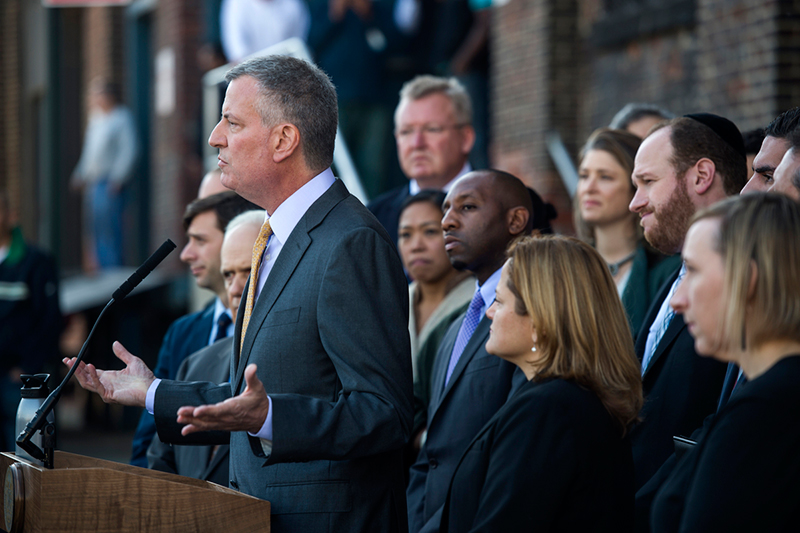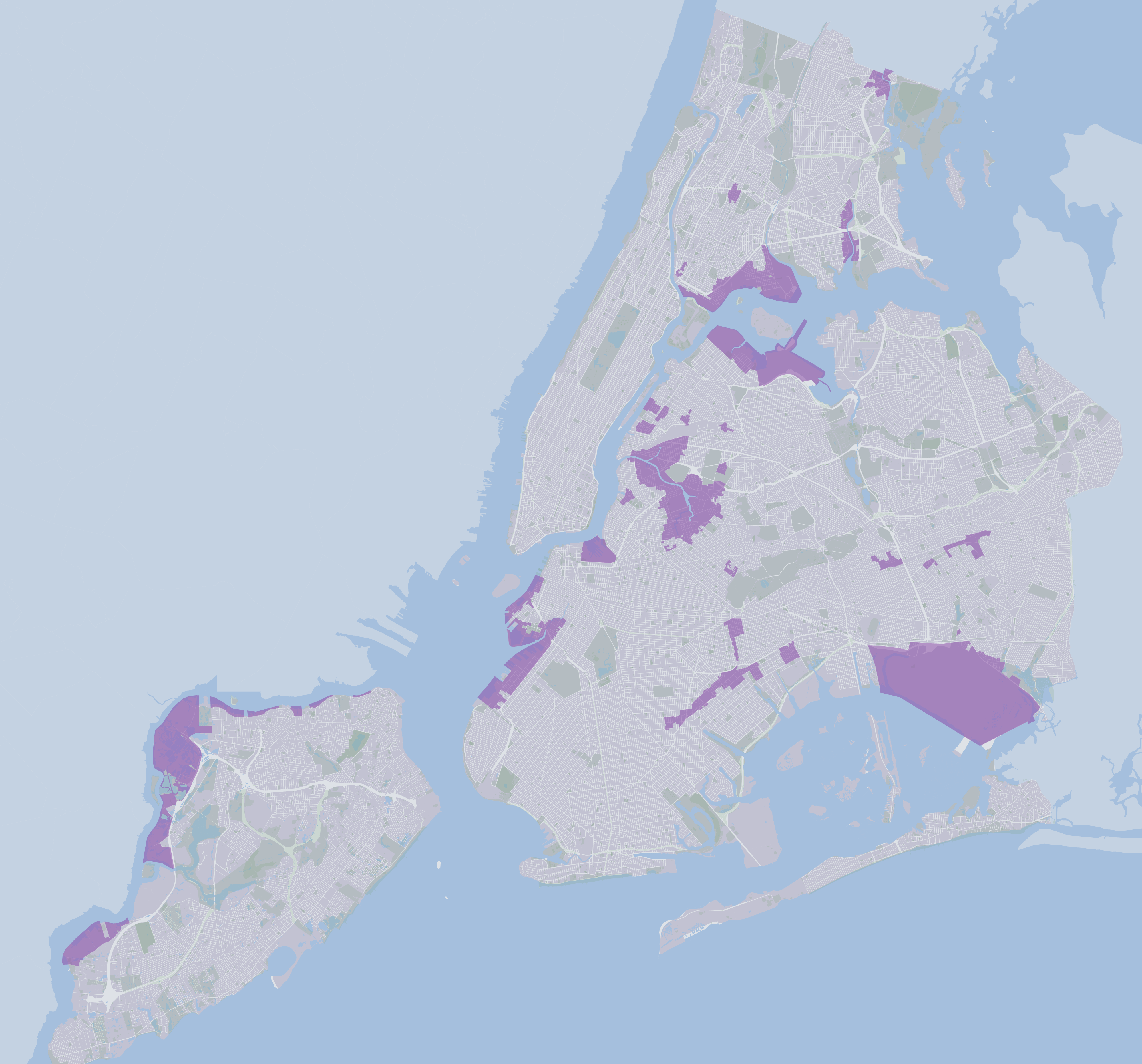Introduction
Three years ago this week, the de Blasio Administration announced its 10-Point Industrial Action Plan, an important and forward-thinking effort aimed at strengthening job opportunities in the city’s industrial and manufacturing sector by using a policy toolkit that included land use, mission-driven development, financing, and workforce development strategies. Recognizing that the industrial and manufacturing sector is an essential source of good-paying jobs with low barriers to entry, the Administration set out to more effectively combine existing policy tools, as well as craft new tools to support the industrial and manufacturing sector as part of a broader City approach to address economic inequality. At the release of the 10-Point Industrial Action Plan, the Mayor, City Council, and advocates gathered in North Brooklyn to praise the ambitious plan to tackle displacement, grow jobs, and create new opportunities for equitable economic development.
 The three-year anniversary of the Plan is an important opportunity to look back at what has been accomplished and evaluate where the Administration has fulfilled its own vision, where it has fallen short, and suggest where some additional steps forward can be taken. The Administration‘s focus on preserving and expanding job opportunities in the industrial and manufacturing sector is an urgent policy goal. With average wages twice that of the retail sector, the industrial and manufacturing sector has historically played a central role in providing decent job opportunities and economic mobility. Advocates of equitable economic development have been concerned that the competition for land in our strong-market city has led to a rapid loss of our industrial and manufacturing infrastructure, driven by real estate developers pushing for the significantly higher profit margins that high-end residential development brings.
The three-year anniversary of the Plan is an important opportunity to look back at what has been accomplished and evaluate where the Administration has fulfilled its own vision, where it has fallen short, and suggest where some additional steps forward can be taken. The Administration‘s focus on preserving and expanding job opportunities in the industrial and manufacturing sector is an urgent policy goal. With average wages twice that of the retail sector, the industrial and manufacturing sector has historically played a central role in providing decent job opportunities and economic mobility. Advocates of equitable economic development have been concerned that the competition for land in our strong-market city has led to a rapid loss of our industrial and manufacturing infrastructure, driven by real estate developers pushing for the significantly higher profit margins that high-end residential development brings.
As this report card shows, some components of the Industrial Action Plan have been implemented while others have stalled. The Industrial Jobs Coalition believes that the policy, zoning, and funding commitments made by the Administration have made important progress in some areas, and built a meaningful foundation for City industrial policy to support good-paying jobs for residents who most need them. We look forward to working with the City towards the goal of a more inclusive and equitable economy.
Assessment
 Invest in City-Owned Properties
Invest in City-Owned Properties
The Administration committed to investing a total of $442 million in City-owned industrial properties. This commitment was kept, with investments happening across the Brooklyn Army Terminal, Brooklyn Navy Yard, Sunset Park’s Made in NY campus, and the Hunts Point Peninsula. Additionally, Brooklyn Navy Yard’s master plan for new and innovative development is a forward-thinking approach to urban manufacturing.
 Advance Use Group Reform
Advance Use Group Reform
The Administration committed to restricting self-storage and hotel development in the City’s 21 Industrial Business Zones (IBZs) as a way to preserve space for manufacturing uses. While the self-storage text amendment was introduced by the City in the Spring of 2017, the Department of City Planning (DCP) presented a significantly weakened version of the text that undermined the original intent of the policy. However, it was the City Council that led the successful effort to pass a text amendment that restricted self-storage, codified the IBZs in zoning maps, and created a land use foundation for future restrictions. On hotels, the restriction was delayed, giving hotel projects more time to get in the ground ahead of any zoning action. The hotel restriction is currently going through the land use process, but further use group restrictions on competing uses are needed to achieve the Administration’s policy goals. Currently, the Department of City Planning has yet to commit to any additional restrictions.

 Create New Zoning Models For Diverse Neighborhoods
Create New Zoning Models For Diverse Neighborhoods
The Administration committed to working with stakeholders to develop a zoning framework for “Innovation Districts,” leveraging the ongoing North Brooklyn study as a blueprint for land use policy in all 21 Industrial Business Zones (IBZs). The City failed to advance a zoning framework for Innovation Districts, and the Department of City Planning missed its publicly announced end of 2016 release date for the long-awaited North Brooklyn study. As a result, mixed use projects and neighborhood rezonings with manufacturing areas are moving forward without an overall framework. The Department of City Planning’s lack of leadership on this issue, including the absence of any enforcement reform, has left communities scrambling to assemble their own solutions. At the rate that North Brooklyn is changing and given the number of neighborhood rezonings, the absence of any zoning models to inform local zoning debates is a failure that will become more pronounced.

 Stop Conversion of Manufacturing to Residential in Core Industrial Areas
Stop Conversion of Manufacturing to Residential in Core Industrial Areas
The Administration committed to not support any private applications for residential uses in the Industrial Business Zones (IBZs). Both the Administration and City Council have continued to fulfill this commitment, speaking out against possible conversions that would establish residential uses within the Industrial Business Zones. It is important to note that this commitment is not codified in formal text or legislation, but is an informal commitment that will require the continued support of future mayors and city councils. While opposing the conversion of Manufacturing (M) to Residential (R) zoning within the IBZs has created clarity in these areas, there is no clear standard of how the City handles conversion of M to R beyond the IBZs. Such a standard, especially in light of the neighborhood rezonings, is a necessary next step to achieve this item’s policy goals.
 Launch Non-Profit Industrial Developer Fund
Launch Non-Profit Industrial Developer Fund
The Administration committed to launching an industrial and manufacturing fund to stimulate the creation of new industrial and manufacturing space by non-profit and mission-driven developers. The Fund was launched in the Spring of 2016. While only one award has been made as of October 2018, the Economic Development Corporation has modified the program design and is on track to make full and effective use of the available program funds. At a time when there are few financing options available for the creation of below-market industrial space, the Fund has played a crucial role in making non-profit development of industrial space possible.
 Launch Futureworks NYC
Launch Futureworks NYC
The Administration committed to create an Advanced Manufacturing Center to serve as a cornerstone of a new Advanced Manufacturing suite of programs and services called “Futureworks NYC,” which launched in the Spring of 2017. However, the closure of Tech Shop, the originally proposed operator for the Advanced Manufacturing Center in October 2017, slowed down an otherwise more aggressive programmatic rollout. This closure also prompted the Economic Development Corporation to release a new request-for-proposals for operators, selecting Staten Island Makerspace to manage operations of the Center beginning early 2019. Since then, the Economic Development Corporation successfully launched the Futureworks Incubator, a hardware startup incubator; Futureworks Shops, a network of fabrication and prototyping facilities; and Ops21, a multi-faceted program aimed at making advanced technology, knowledge, and resources more accessible to New York City manufacturers. To date, workshops on advanced materials, digital manufacturing, and robotics have had a positive response from participating manufacturers. Given the course correction required in 2017, it is too early to determine whether or not this program has been fully successful.
 Expand Brownfields Jumpstart Program
Expand Brownfields Jumpstart Program
The Administration committed to expand its Brownfield Jumpstart program, which will help businesses enroll in the New York State Brownfield Cleanup Program, opening up additional sites and space for new industrial and manufacturing businesses. Although originally conceived for affordable housing, the JumpStart Grant funding’s expansion to commercial and industrial development provides increased grant accessibility for job creating development. This program has led to over $4.5 billion in new investment, with 40% of new development being job-producing retail, commercial, industrial, and office space. The results have been recognized with Mayor’s Office of Environmental Remediation’s launch of EPIC Community – a new website to track brownfield projects, celebrate success stories, and learn how grant funds can be leveraged by community groups.
 Relaunch Industrial Business Service Providers Network
Relaunch Industrial Business Service Providers Network
The Administration committed to relaunch and baseline funding for the Industrial Business Service Providers (IBSPs) network, which provides technical support for businesses across the city. Over the three years of stable funding, the IBSPs have supported local small businesses with education, promotion, access to financing, and incentives as well as workforce services and job placement. IBSPs also help to promote and advance industrial policy commitments and enroll firms in public programs. The providers have been largely successful during the 3-year baseline period, such as facilitating over $31 million in lending and grants over the past 12 months. The City should increase funding for needed services and baseline the IBSP network for another three years. Such a commitment will ensure that local businesses will continue to have access to the vital services they have enjoyed since the relaunch of the network.
 Launch Industry Partnerships
Launch Industry Partnerships
The Administration committed to launching an Industrial and Manufacturing Industry Partnership as part of its broader Career Pathways initiative. Since Career Pathways, the Administration released its New York Works report, which seeks to overhaul the workforce and jobs system around manufacturing and three other sectors. Building off of the manufacturing industry partnership, the Department of Small Business Services and Economic Development Corporation launched ApprenticeNYC, an 18-month program to connect manufacturers with participants with paid, full-time apprenticeships as computer numerical control machinists. As ApprenticeNYC has only launched earlier this year, it is not possible to fully gauge the success of this new initiative. However, it is worth recognizing that such a program would not have been possible without the collaboration of the City and the local manufacturing industry.
 Establish Manufacturing Career Centers
Establish Manufacturing Career Centers
Based on the success of the Industrial and Transportation Career Center in Jamaica, the Administration committed to create up to five additional satellite career centers in select IBZs. Career centers have been opened in Port Morris in the Bronx, the North Shore of Staten Island, and the Brooklyn Army Terminal. Coupled with the aforementioned industry partnerships and specifically the ApprenticeNYC initiative, the workforce pipeline is beginning to take shape. The efficacy of this new pipeline, however, remains unproven.
Conclusion
The Administration’s progress on the Industrial Action Plan has been uneven, and there have often been different outcomes based on which City agency was responsible for implementing a specific component of the plan. For example, the Department of Small Business Services has been primarily responsible for the energetic workforce development components of the plan and the successful work of the Industrial Business Service Providers (IBSPs). Similarly, the Economic Development Corporation launched the Industrial Developer Fund and has led much of the City’s industrial investment strategy. However, many of the components of the Industrial Action Plan that were led by the Department of City Planning have fallen short. Given the heightened pace of neighborhood rezonings and growing willingness of communities to push forward new ideas on industrial zoning and land use, the lack of progress on zoning reform severely hinders the otherwise commendable work done by the Administration to advance the industrial and manufacturing sector.